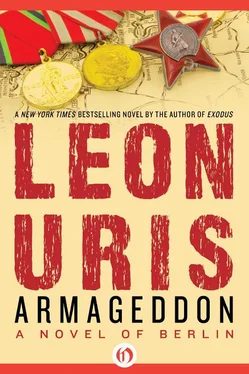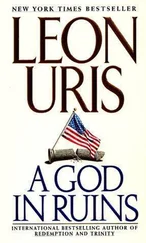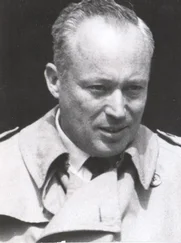Armageddon - Leon Uris
Здесь есть возможность читать онлайн «Armageddon - Leon Uris» весь текст электронной книги совершенно бесплатно (целиком полную версию без сокращений). В некоторых случаях можно слушать аудио, скачать через торрент в формате fb2 и присутствует краткое содержание. Жанр: Старинная литература, на английском языке. Описание произведения, (предисловие) а так же отзывы посетителей доступны на портале библиотеки ЛибКат.
- Название:Leon Uris
- Автор:
- Жанр:
- Год:неизвестен
- ISBN:нет данных
- Рейтинг книги:4 / 5. Голосов: 1
-
Избранное:Добавить в избранное
- Отзывы:
-
Ваша оценка:
- 80
- 1
- 2
- 3
- 4
- 5
Leon Uris: краткое содержание, описание и аннотация
Предлагаем к чтению аннотацию, описание, краткое содержание или предисловие (зависит от того, что написал сам автор книги «Leon Uris»). Если вы не нашли необходимую информацию о книге — напишите в комментариях, мы постараемся отыскать её.
Leon Uris — читать онлайн бесплатно полную книгу (весь текст) целиком
Ниже представлен текст книги, разбитый по страницам. Система сохранения места последней прочитанной страницы, позволяет с удобством читать онлайн бесплатно книгу «Leon Uris», без необходимости каждый раз заново искать на чём Вы остановились. Поставьте закладку, и сможете в любой момент перейти на страницу, на которой закончили чтение.
Интервал:
Закладка:
“Let me by or you’ll cut your own throat.”
She stepped forward, daring him to lay a hand on her. Scott backed off. She continued down the street and turned the corner at Gustav Freytag Strasse and walked into the Loveless house.
Nick Papas laughed until the tears streamed down his grizzly cheeks.
“All right, you Greek bastard, you want to sweeten that bet?”
“Jawohl!”
“Fifty says I have her in the sack in a week.”
“A bet,” and he began laughing all over again.
Scott slowed the car before the house of Lieutenant Colonel Clinton Loveless and made a note of the address.
The flight of Big Easy Four contained a crew beset with mixed emotions:
Stan Kitchek was star-gazed by a large romance. He ran on and on about Monika. Sweet girl supporting her child and old mother. But she had never really been in love. It was happening, just like that.
Scott was almost mad enough to tell Stan that Monika was a tank job ... but not quite.
Nick was a mosaic of assorted grins glorying in Scott’s discomfort.
As they talked to Tempelhof Airways, Stan got out of his seat for a moment and took a big carton from under the flight engineer’s table and handed it to Nick.
“What the hell’s that?” Scott asked.
“Well, every clear day I see little kids standing on the rubble piles at the end of the cemetery watching us land. Lot of times they’re at the airport, too. But did you ever notice that none of them ever came close to us, talked to us?”
“That’s the way krauts are,” Scott answered.
“Kids shouldn’t be that way,” Stan said, “anyhow, I thought I’d try something.”
“What’s in there?” Nick asked.
Stan opened the carton. The other two looked in curiously. Nick’s big paw fished out a tiny handkerchief parachute. Attached to the strings was a bar of candy. The carton held over a hundred parachutes and candy bars. “I rigged them up in my spare time,” Stan said. “I want you to toss them out of the back door just before we land.”
Nick was touched. Scott shrugged as though Stan were crazy.
The final right turn around the Tempelhof Beacon at five hundred feet began the steep glide that took them over the St. Thomas Cemetery between rows of half-bombed-out apartment houses. Stan looked out. Yes, the children were there on the rubble near the end of the runway. Full flaps ... the big bird slowed. Nick was at the back door throwing out the toy parachutes. They billowed, floated to earth. The children scrambled for them as the craft touched down on the end of the runway.
Within seconds hysterical phone calls were made from Russian spies in the apartments at the end of the runway, and from the Air Safety Center. Strange objects over St Thomas Cemetery! Parachutes! What kind of new sabotage were the Americans up to!
Candy bars?
Candy bars!
Candy bars!
People’s Radio decried it with passion. “The latest American trick is to bribe little children in a heartless effort to justify remaining in Berlin.”
In the days that followed, children in the zone made thousands of toy parachutes for their “friends” in Berlin. Sidney the Kangaroo hopped all the way to New York to collect tens of thousands of candy bars. The ritual of the candy drop took place from many Skymasters every day.
Ulrich Falkenstein said, “It is good for little children to look up to the sky and see a rain of candy bars.”
And thus, the legend of Stan Kitchek, “The Chockolade Flyer,” came to be.
Chapter Twenty-three
A BATTERED ALARM CLOCK sounded. It was two in the morning. Sean reached over the bed for Ernestine. “Honey, don’t get up,” he said, half asleep.
“I will be back as quickly as I can.”
She left the bed groggy and shivering and bundled herself in a heavy robe.
Reinickendorf Borough was receiving its two-hour morning allotment of electricity. Like the rest of the women in the building she yawned around in the middle of the night.
She heated several pans of water. They would be lukewarm by morning, but they could be partly reheated by a “blockade blitz pill” so Sean would not have to shave and wash in icy water. She put up hot thermoses of coffee and breakfast broth, ironed a few pieces of clothing, did a light wash, and cleaned, and did all of the chores that required light and electricity.
Propriety had to be served. This meant finding a room away from his own quarters for himself and Ernestine. It was a room in Reinickendorf in the French Sector close to where the new airfield was being built, a third floor walk-up with some bomb damage, but it did have its own tiny bath and kitchen alcove.
Except for a telephone that could reach him from Headquarters they lived like Berliners. Reading, eating, bathing by candlelight or by the flicker of a kerosene lamp.
“Above all, stand tall,” Berliners were told every night at another rally.
It was hard to stand tall after hours-long waits for rations, scrounging for rare and precious articles such as soap, patching unpatchable clothing, stuffing paper in shoe soles, walking five miles to and from work in darkness. Life was further reduced to semiprimitive existence.
Hospitals scheduled operations and X-rays at rare hours; schools struggled on without heat, light, textbooks. Radios were heard by pooling to save precious batteries; most of the news was broadcast on mobile trucks.
Dentists’ wives supplied power for drills by generating electricity by pumping bicycle wheels; concerts and lectures and rallies were held by candlelight; cinemas played in the middle of the night to audiences who often walked across half the city to get to them.
There was no glass to replace a broken window, no parts to repair a watch, no automobiles for civilians, no malt for beer; no typewriter ribbons for offices, no paint, no cosmetics, no hardware, no machine parts.
Rubble fields were bulldozed or cleared by hand and blockade gardens attempted to induce a few vegetables from the earth with seeds donated from Munich and Hanover and Heidelberg.
Blockade runners crossed from the Russian Zone at great risk and their black market prices were high. The Americans “officially” frowned on it, but quietly saw to it that the blockade runners got enough gasoline to keep in business, for even at smugglers’ prices any food augment was precious.
Yet, out of this darkness a legacy came into being. Berliners were hanging together, shrugging at hardship, laughing at their own plight:
“Better dried potatoes than Kumm Frau.”
“Thank goodness the Americans aren’t blockading and the Russians trying to Airlift us.”
The life of powdered eggs, scavenging for twigs, the long lines, the candlelight, the Russian abuses, the checkpoints went on, but the people became tougher with an infectious feeling of martyrdom cementing them together.
The only moment a Berliner’s heart leaped with fear was when the beat of the engines stopped above them. Berlin lived on one lung and its faint heartbeat was the sound of the engines of the birds.
In this battle of will power, they held their share of the fortress wall.
A short way from where Sean and Ernestine had their room, the third airfield raced to completion.
The engineers of the 350th Support Squadron in Berlin picked an area adjoining French Headquarters, near the Tegel Forest—a flat field an equal distance from Tempelhof and Gatow. They scoured Berlin for heavy construction equipment, but were able to come up with little more than steam rollers dated from the turn of the century.
At the Hanau Base in the American Zone the heavy equipment was assembled, cut up by torches, transported in the C-74 and C-82 transports, and put on special flying duty on the Lift. Ten thousand barrels of asphalt were brought to Berlin along with pierced steel planking.
Читать дальшеИнтервал:
Закладка:
Похожие книги на «Leon Uris»
Представляем Вашему вниманию похожие книги на «Leon Uris» списком для выбора. Мы отобрали схожую по названию и смыслу литературу в надежде предоставить читателям больше вариантов отыскать новые, интересные, ещё непрочитанные произведения.
Обсуждение, отзывы о книге «Leon Uris» и просто собственные мнения читателей. Оставьте ваши комментарии, напишите, что Вы думаете о произведении, его смысле или главных героях. Укажите что конкретно понравилось, а что нет, и почему Вы так считаете.











